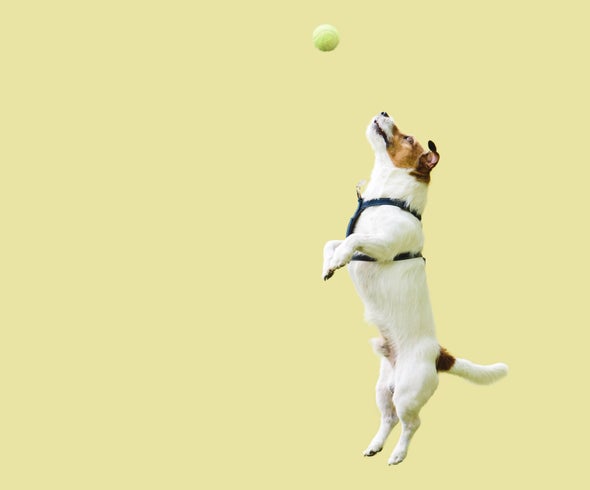(单词翻译:单击)
听力文本
This is Scientific American's 60-second Science, I'm Christopher Intagliata.
You know how in the Road Runner cartoons, whenever something drops—like Wile E. Coyote falling off a cliff—it makes this sound?
(CLIP: Cartoon dropping sound)
"And obviously, if you hear that sound, you assume that something is falling down rather than going up, and this is something we as humans do automatically."
Anna Korzeniowska is an animal behavior scientist at the University of Sussex in the U.K. And she wanted to see whether dogs might also associate falling objects with falling sounds.
"But obviously, we can't ask them."
So instead she recruited 101 canines—not all dalmatians, if you're wondering. And she had the dogs watch a short video sequence, in the lab, of a blue ball rising and falling on the screen. The video was accompanied by either a corresponding rising and falling tone....
(CLIP: Rising and falling sound)
... or the opposite, more counterintuitive pairing of the ball falling with a tone that was rising.

After running these tests, the researchers analyzed video of the dogs. They coded each frame using a program called Gamebreaker, which is usually used to analyze sports footage.
And the researchers found that while the dogs spent equal amounts of time looking at both video sequences, they spent a larger proportion of that time tracing the movement of the ball with their heads when the direction of the ball and the sound aligned—perhaps suggesting that they were more engaged when sight seemed to match sound. The results are in the journal Biology Letters.
And although we can't truly know what the dogs were thinking—or whether this behavior really means they find corresponding tones and motion more captivating—it might nevertheless be something for us humans to ponder as we play fetch with Fido.
Thanks for listening for Scientific American's 60-second Science. I'm Christopher Intagliata.
参考译文
这里是科学美国人——60秒科学系列,我是克里斯托弗·因塔格里塔。
你知道在《BB鸟》动画片中,当有东西掉下来时——比如歪心狼掉下悬崖时——会发出这种声音吗?
(音频剪辑:动画片中的掉落声)
“很明显,如果你听到这个声音,你会假设有东西在掉落而不是上升,这是我们人类自动意识到的事情。”
安娜·科泽尼奥斯卡是英国苏赛克斯大学的动物行为科学家。她想弄清狗是否也会将掉落物体与掉落音效联系起来。
“但显然,我们不能直接问它们。”
因此,她招募了101只狗,如果你好奇的话,这些狗并不全是斑点狗。她让狗狗们在实验室里观看一小段视频序列,内容是屏幕上有个蓝色球在上升和下落。视频中要么搭配与动作对应的上升和下落音效……
(音频剪辑:升降声)
要么相反,在球掉落时配上升音效的反直觉搭配。
完成这些测试之后,研究人员对狗狗的反应视频进行了分析。他们用Gamebreaker程序对每一帧进行编码,该程序通常用于分析运动镜头。
研究人员发现,虽然狗狗观看两个视频序列的时间基本相同,但当球的运动方向与音效一致时,它们的头随球上下运动的时间更多,这或许说明,当视觉与听常见匹配时,它们会更专注。研究结果发表在《生物学通讯》期刊上。
尽管我们不能真正明白狗狗当时在想什么,或者这种行为是否真的表明它们发现音效与动作一致时更具吸引力,但这可能是我们人类与狗狗玩耍时会思考的东西。
谢谢大家收听科学美国人——60秒科学。我是克里斯托弗·因塔利亚塔。
译文为可可英语翻译,未经授权请勿转载!
重点讲解
重点讲解:
1. fall off 掉下;
When you are learning to ride a bicycle, you often fall off.
初学骑自行车时,常会从车上掉下来。
2. rather than 而非;胜于;而不是;
You are buying direct, rather than through an agent.
你这是直接购买,而不是通过代理人。
3. go up 上涨,上升;
Then Jobic saw that the bottom of the sea was beginning to go up like a hill.
然后若比看见海底像小山一样上升。
4. look at 看,瞧,望;
Isn't it fantastic? Just look at that!
这是不是棒极了?看看那个!


